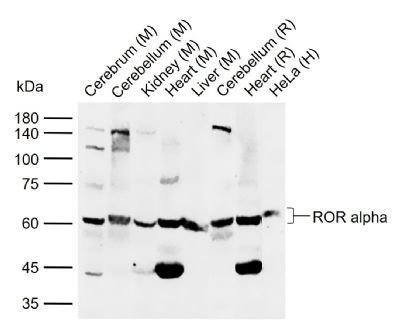Sample:
Lane 1: Mouse Cerebrum tissue lysates
Lane 2: Mouse Cerebellum tissue lysates
Lane 3: Mouse Kidney tissue lysates
Lane 4: Mouse Heart tissue lysates
Lane 5: Mouse Liver tissue lysates
Lane 6: Rat Cerebellum tissue lysates
Lane 7: Rat Heart tissue lysates
Lane 8: Human HeLa cell lysates
Primary: Anti-ROR alpha (SL20687R) at 1/1000 dilution
Secondary: IRDye800CW Goat Anti-Rabbit IgG at 1/20000 dilution
Predicted band size: 59 kDa
Observed band size: 60 kDa
